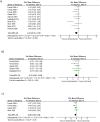Antioxidant agents for delaying diabetic kidney disease progression: A systematic review and meta-analysis
- PMID: 28570649
- PMCID: PMC5453586
- DOI: 10.1371/journal.pone.0178699
Antioxidant agents for delaying diabetic kidney disease progression: A systematic review and meta-analysis
Abstract
Background: Oxidative stress is a key player in the genesis and worsening of diabetic kidney disease (DKD). We aimed at collecting all available information on possible benefits of chronic antioxidant supplementations on DKD progression.
Study design: Systematic review and meta-analysis.
Population: Adults with DKD (either secondary to type 1 or 2 diabetes mellitus).
Search strategy and sources: Cochrane CENTRAL, Ovid-MEDLINE and PubMed were searched for randomized controlled trials (RCTs) or quasi-RCTs without language or follow-up restriction.
Intervention: Any antioxidant supplementation (including but not limited to vitamin A, vitamin C, vitamin E, selenium, zinc, methionine or ubiquinone) alone or in combination.
Outcomes: Primary outcome was progression to end-stage kidney disease (ESKD). Secondary outcomes were change in albuminuria, proteinuria, serum creatinine and renal function.
Results: From 13519 potentially relevant citations retrieved, 15 articles referring to 14 full studies (4345 participants) met the inclusion criteria. Antioxidant treatment significantly decreased albuminuria as compared to control (8 studies, 327 participants; SMD: -0.47; 95% CI -0.78, -0.16) but had apparently no tangible effects on renal function (GFR) (3 studies, 85 participants; MD -0.12 ml/min/1.73m2; 95% CI -0.06, 0.01). Evidence of benefits on the other outcomes of interest was inconclusive or lacking.
Limitations: Small sample size and limited number of studies. Scarce information available on hard endpoints (ESKD). High heterogeneity among studies with respect to DKD severity, type and duration of antioxidant therapy.
Conclusions: In DKD patients, antioxidants may improve early renal damage. Future studies targeting hard endpoints and with longer follow-up and larger sample size are needed to confirm the usefulness of these agents for retarding DKD progression.
Conflict of interest statement
Figures




References
-
- Wild S, Roglic G, Green A, Sicree R, King H. Global prevalence of diabetes: estimates for the year 2000 and projections for 2030. Diabetes Care. 2004;27(5):1047–53. . - PubMed
Publication types
MeSH terms
Substances
LinkOut - more resources
Full Text Sources
Other Literature Sources
Medical
Miscellaneous

